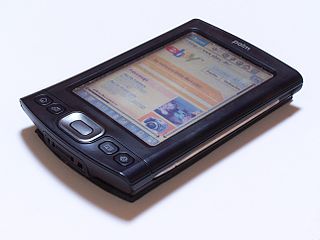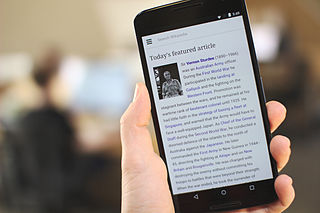See also
| Executive team |
| ||||||||
|---|---|---|---|---|---|---|---|---|---|
| Devices |
| ||||||||
| Services | |||||||||
A list of BlackBerry -related topics

A personal digital assistant (PDA), also known as a handheld PC, is a multi-purpose mobile device which functions as a personal information manager. PDAs have been mostly displaced by the widespread adoption of highly capable smartphones, in particular those based on iOS and Android, and thus saw a rapid decline in use after 2007.

Palm OS was a mobile operating system initially developed by Palm, Inc., for personal digital assistants (PDAs) in 1996. Palm OS was designed for ease of use with a touchscreen-based graphical user interface. It was provided with a suite of basic applications for personal information management. Later versions of the OS were extended to support smartphones. The software appeared on the company's line of Palm devices while several other licensees have manufactured devices powered by Palm OS.
In computing, cross-platform software is computer software that is designed to work in several computing platforms. Some cross-platform software requires a separate build for each platform, but some can be directly run on any platform without special preparation, being written in an interpreted language or compiled to portable bytecode for which the interpreters or run-time packages are common or standard components of all supported platforms.
A computing platform, digital platform, or software platform is an environment in which software is executed. It may be the hardware or the operating system (OS), a web browser and associated application programming interfaces, or other underlying software, as long as the program code is executed using the services provided by the platform. Computing platforms have different abstraction levels, including a computer architecture, an OS, or runtime libraries. A computing platform is the stage on which computer programs can run.

A smartphone is a mobile device that combines the functionality of a traditional mobile phone with advanced computing capabilities. It typically has a touchscreen interface, allowing users to access a wide range of applications and services, such as web browsing, email, and social media, as well as multimedia playback and streaming. Smartphones have built-in cameras, GPS navigation, and support for various communication methods, including voice calls, text messaging, and internet-based messaging apps.
An application program is a computer program designed to carry out a specific task other than one relating to the operation of the computer itself, typically to be used by end-users. Word processors, media players, and accounting software are examples. The collective noun "application software" refers to all applications collectively. The other principal classifications of software are system software, relating to the operation of the computer, and utility software ("utilities").

Mobile computing is human–computer interaction in which a computer is expected to be transported during normal usage and allow for transmission of data, which can include voice and video transmissions. Mobile computing involves mobile communication, mobile hardware, and mobile software. Communication issues include ad hoc networks and infrastructure networks as well as communication properties, protocols, data formats, and concrete technologies. Hardware includes mobile devices or device components. Mobile software deals with the characteristics and requirements of mobile applications.
Windows Mobile is a discontinued mobile operating system developed by Microsoft for smartphones and personal digital assistants.

Maemo is a software platform originally developed by Nokia, now developed by the community, for smartphones and Internet tablets. The platform comprises both the Maemo operating system and SDK. Maemo played a key role in Nokia's strategy to compete with Apple and Android, but ultimately failed to surpass both companies.Maemo is mostly based on open-source code and has been developed by Maemo Devices within Nokia in collaboration with many open-source projects such as the Linux kernel, Debian, and GNOME. Maemo is based on Debian and draws much of its GUI, frameworks, and libraries from the GNOME project. It uses the Matchbox window manager and the GTK-based Hildon framework as its GUI and application framework.

A tablet computer, commonly shortened to tablet, is a mobile device, typically with a mobile operating system and touchscreen display processing circuitry, and a rechargeable battery in a single, thin and flat package. Tablets, being computers, have similar capabilities, but lack some input/output (I/O) abilities that others have. Modern tablets largely resemble modern smartphones, the only differences being that tablets are relatively larger than smartphones, with screens 7 inches (18 cm) or larger, measured diagonally, and may not support access to a cellular network. Unlike laptops, tablets usually run mobile operating systems, alongside smartphones.
BlackBerry Enterprise Server designates the middleware software package that is part of the BlackBerry wireless platform supplied by BlackBerry Limited. The software plus service connects to messaging and collaboration software on enterprise networks to redirect emails and synchronize contacts and calendaring information between servers, desktop workstations, as well as mobile devices. Some third-party connectors exist, including Scalix, Zarafa, Zimbra, and the Google Apps BES Connector, although these are not supported by BlackBerry Limited. As of June 2018, BlackBerry Enterprise Server has been renamed to BlackBerry Unified Endpoint Manager (UEM).

Adobe AIR is a cross-platform runtime system currently developed by Harman International, in collaboration with Adobe Inc., for building desktop applications and mobile applications, programmed using Adobe Animate, ActionScript, and optionally Apache Flex. It was originally released in 2008. The runtime supports installable applications on Windows, macOS, and mobile operating systems, including Android, iOS, and BlackBerry Tablet OS.
A mobile operating system is an operating system used for smartphones, tablets, smartwatches, smartglasses, or other non-laptop personal mobile computing devices. While computers such as typical/mobile laptops are "mobile", the operating systems used on them are generally not considered mobile, as they were originally designed for desktop computers that historically did not have or need specific mobile features. This line distinguishing mobile and other forms has become blurred in recent years, due to the fact that newer devices have become smaller and more mobile unlike hardware of the past. Key notabilities blurring this line are the introduction of tablet computers, light-weight laptops, and the hybridization of the two in 2-in-1 PCs.
BlackBerry OS is a discontinued proprietary mobile operating system developed by Canadian company BlackBerry Limited for its BlackBerry line of smartphone handheld devices. The operating system provides multitasking and supports specialized input devices adopted by BlackBerry for use in its handhelds, particularly the trackwheel, trackball, and most recently, the trackpad and touchscreen.

Mobile technology is the technology used for cellular communication. Mobile technology has evolved rapidly over the past few years. Since the start of this millennium, a standard mobile device has gone from being no more than a simple two-way pager to being a mobile phone, GPS navigation device, an embedded web browser and instant messaging client, and a handheld gaming console. Many experts believe that the future of computer technology rests in mobile computing with wireless networking. Mobile computing by way of tablet computers is becoming more popular. Tablets are available on the 3G and 4G networks.

Symbian is a discontinued mobile operating system (OS) and computing platform designed for smartphones. It was originally developed as a proprietary software OS for personal digital assistants in 1998 by the Symbian Ltd. consortium. Symbian OS is a descendant of Psion's EPOC, and was released exclusively on ARM processors, although an unreleased x86 port existed. Symbian was used by many major mobile phone brands, like Samsung, Motorola, Sony Ericsson, and above all by Nokia. It was also prevalent in Japan by brands including Fujitsu, Sharp and Mitsubishi. As a pioneer that established the smartphone industry, it was the most popular smartphone OS on a worldwide average until the end of 2010, at a time when smartphones were in limited use, when it was overtaken by iOS and Android. It was notably less popular in North America.
Mobile Business Intelligence is defined as “Mobile BI is a system comprising both technical and organizational elements that present historical and/or real-time information to its users for analysis on mobile devices such as smartphones and tablets, to enable effective decision-making and management support, for the overall purpose of increasing firm performance.”. Business intelligence (BI) refers to computer-based techniques used in spotting, digging-out, and analyzing business data, such as sales revenue by products and/or departments or associated costs and incomes.
An app store, also called an app marketplace or app catalog, is a type of digital distribution platform for computer software called applications, often in a mobile context. Apps provide a specific set of functions which, by definition, do not include the running of the computer itself. Complex software designed for use on a personal computer, for example, may have a related app designed for use on a mobile device. Today apps are normally designed to run on a specific operating system—such as the contemporary iOS, macOS, Windows, Linux or Android—but in the past mobile carriers had their own portals for apps and related media content.
A mobile application or app is a computer program or software application designed to run on a mobile device such as a phone, tablet, or watch. Mobile applications often stand in contrast to desktop applications which are designed to run on desktop computers, and web applications which run in mobile web browsers rather than directly on the mobile device.

The BlackBerry Z30 is a high-end 4G touchscreen smartphone developed by BlackBerry. Announced on September 18, 2013, it succeeds the Z10 as the second totally touchscreen device to run the BlackBerry 10 operating system. The Z30 includes a 5-inch 720p Super AMOLED display with "quad-core graphics", speakers and microphones with "Natural Sound" technology, six processor cores and a non-removable 2880 mAh battery. The BlackBerry Z30 also uses Paratek Antenna Technology. This refers to the number of proprietary advancements in antenna hardware and tuning technology that is aimed to improve performance especially in regions with low signal.